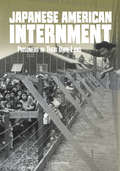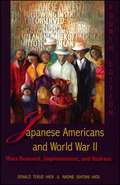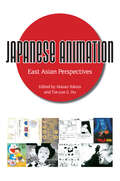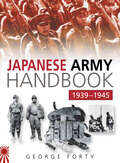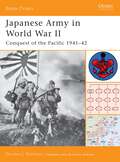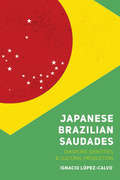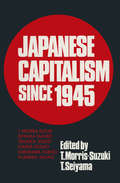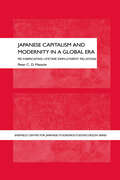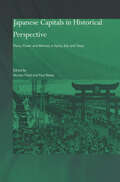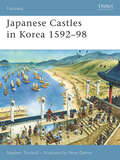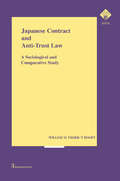- Table View
- List View
Japanese American Celebration and Conflict: A History of Ethnic Identity and Festival, 1934-1990
by Lon KurashigeA history of the struggles over identity within the Japanese American community, using ethnic festivals to reveal the conflicts from the 1930s (a period of wealthy Japanese enclaves) through the WWII internment to the late 20th century influx of investment from Japan.
Japanese American Incarceration: The Camps and Coerced Labor during World War II (Politics and Culture in Modern America)
by Stephanie D. HinnershitzBetween 1942 and 1945, the U.S. government wrongfully imprisoned thousands of Japanese American citizens and profited from their labor. Japanese American Incarceration recasts the forced removal and incarceration of approximately 120,000 Japanese Americans during World War II as a history of prison labor and exploitation.Following Franklin Roosevelt's 1942 Executive Order 9066, which called for the exclusion of potentially dangerous groups from military zones along the West Coast, the federal government placed Japanese Americans in makeshift prisons throughout the country. In addition to working on day-to-day operations of the camps, Japanese Americans were coerced into harvesting crops, digging irrigation ditches, paving roads, and building barracks for little to no compensation and often at the behest of privately run businesses—all in the name of national security.How did the U.S. government use incarceration to address labor demands during World War II, and how did imprisoned Japanese Americans respond to the stripping of not only their civil rights, but their labor rights as well? Using a variety of archives and collected oral histories, Japanese American Incarceration uncovers the startling answers to these questions. Stephanie D. Hinnershitz's timely study connects the government's exploitation of imprisoned Japanese Americans to the history of prison labor in the United States.
Japanese American Internment: Prisoners in Their Own Land (Tangled History)
by Steven OtfinoskiVivid storytelling brings World War II history to life and place readers in the shoes of the people who experienced the United States' Japanese internment camps. On the heels of Japan's surprise attack on Pearl Harbor in December 1941, President Franklin D. Roosevelt issued Executive Order 9066. Through this order, more than 110,000 people of Japanese descent, many of them U.S. citizens, were forced to relocate to military camps for the duration of the war. Suspenseful, dramatic events unfold in chronological, interwoven stories from the different perspectives of people who experienced these events while they were happening. Narratives intertwine to create a breathless, "What's Next?" kind of read. Students gain a new perspective on historical figures as they learn about real people struggling to decide how best to act in a given moment.
Japanese American Resettlement Through the Lens
by Lane Ryo Hirabayashi Kenichiro ShimadaIn Japanese American Resettlement through the Lens, Lane Ryo Hirabayashi gathers a unique collection of photographs by War Relocation Authority photographer Hikaru Iwasaki, the only full-time WRA photographer from the period still living. With substantive focus on resettlement - and in particular Iwasaki's photos of Japanese Americans following their release from WRA camps from 1943 to 1945 - Hirabayashi explores the WRA's use of photography in its mission not only to encourage "loyal" Japanese Americans to return to society at large as quickly as possible but also to convince Euro-Americans this was safe and advantageous. Hirabayashi also assesses the relative success of the WRA project, as well as the multiple uses of the photographs over time, first by the WRA and then by students, scholars, and community members in the present day. Although the photos have been used to illustrate a number of publications, this book is the first sustained treatment addressing questions directly related to official WRA photographs. How and under what conditions were they taken? Where were they developed, selected, and stored? How were they used during the 1940s? What impact did they have during and following the war? By focusing on the WRA's Photographic Section, Japanese American Resettlement through the Lens makes a unique contribution to the body of literature on Japanese Americans during World War II.
Japanese American Resettlement through the Lens: Hikaru Iwasaki and the WRA's Photographic Section, 1943-1945
by Lane Ryo Hirabayashi Kenichiro ShimadaPhotographs by Hikaru C. IwasakiForeword by the Honorable Norman Y. Mineta In Japanese American Resettlement through the Lens, Lane Ryo Hirabayashi gathers a unique collection of photographs by War Relocation Authority photographer Hikaru Iwasaki, the only full-time WRA photographer from the period still living. With substantive focus on resettlement - and in particular Iwasaki's photos of Japanese Americans following their release from WRA camps from 1943 to 1945 - Hirabayashi explores the WRA's use of photography in its mission not only to encourage "loyal" Japanese Americans to return to society at large as quickly as possible but also to convince Euro-Americans this was safe and advantageous. Hirabayashi also assesses the relative success of the WRA project, as well as the multiple uses of the photographs over time, first by the WRA and then by students, scholars, and community members in the present day. Although the photos have been used to illustrate a number of publications, this book is the first sustained treatment addressing questions directly related to official WRA photographs. How and under what conditions were they taken? Where were they developed, selected, and stored? How were they used during the 1940s? What impact did they have during and following the war? By focusing on the WRA's Photographic Section, Japanese American Resettlement through the Lens makes a unique contribution to the body of literature on Japanese Americans during World War II.
Japanese Americans and World War II: Mass Removal, Imprisonment, and Redress
by Donald Teruo Hata Nadine Ishitani HataLike its predecessors, this fourth edition of "Japanese Americans and World War II" is intended as a succinct and affordable supplement to history and political science texts that minimize or neglect the "Nikkei" (Japanese American) experience in World War II. As was hoped, the first two editions of this publication found an enthusiastic reception by instructors and students alike at the high school, community college, and university level. In addition, the expanded third edition found a new readership beyond the classroom, in members of and visitors to museums, such as the Japanese American Museum in Los Angeles, and interpretive centers at former concentration camp sites administered by the National Park Service at Manzanar, Tule Lake, and others (some in progress). In response to the supportive and constructive feedback of students, instructors, and lay readers, we at Harlan Davidson undertook a bold and sweeping redesign of the third edition that saw our well-loved little "pamphlet" become an attractive but still highly affordable book that, in addition to taking the narrative completely up to date, has been thoroughly re-edited and expanded further to include photographs, key documents, and an enhanced multidisciplinary bibliography of 200 core publications by historians, political scientists, sociologists, anthropologists, and others, as well as multimedia and Internet-based sources. Inaccurate and misleading euphemisms such as "evacuation" and "internment" have been meticulously replaced with more accurate terms like "mass removal" and "imprisonment--changes explained and amplified in a new "Note on Terminology," which explains the movement to correct long out-dated language and refers readers to thoughtful essays on the subject by eminent scholars.
Japanese Animation: East Asian Perspectives
by Masao Yokota and Tze-yue G. HuJapanese Animation: East Asian Perspectives makes available for the first time to English readership a selection of viewpoints from media practitioners, designers, educators, and scholars working in the East Asian Pacific. This collection not only engages a multidisciplinary approach in understanding the subject of Japanese animation but also shows ways to research, teach, and more fully explore this multidimensional world. Presented in six sections, the translated essays cross-reference each other. The collection adopts a wide range of critical, historical, practical, and experimental approaches. This variety provides a creative and fascinating edge for both specialist and nonspecialist readers. Contributors' works share a common relevance, interest, and involvement despite their regional considerations and the different modes of analysis demonstrated. They form a composite of teaching and research ideas on Japanese animation.
Japanese Apologies for World War II: A Rhetorical Study (Routledge Contemporary Japan Series)
by Jane YamazakiPost-war Japan offers a compelling case study of national apologies for past wrongdoings. Actions of the Japanese Army and government during the Second World War caused enormous suffering and distress throughout Asia, leaving a legacy of resentment and distrust. Beginning in the mid-1980s, apology for wartime actions became a recurring issue for Japan. Repeated calls for apology from various quarters as well as repeated apologies by Japanese officials provide a rich source for the study of national apology and how public apology discourse develops over time. Unlike most rhetorical studies that focus on apologia in the broad sense, this study concentrates on the strategy of the ‘true apology.’ The study combines rhetorical, sociological and historical approaches to address multiple examples of Japanese apology during the period 1984 to 1995. The author suggests that motive is more complex than the ‘image restoration’ theory that is prevalent in rhetorical theory. More specifically, this study emphasizes repair of relationships, self-reflection leading to a ‘new’ improved identity and affirmation of moral principle as reasons for apology.
Japanese Architecture: A Short History
by A. L. Sadler Mira LocherA. L. Sadler's invaluable study of Japanese architecture first appeared in 1941. Considered a classic in its field, unequaled in clarity and insight, Japanese Architecture A Short History is a lucid and uncomplicated introduction to this important aspect of Japanese culture. Beginning with the earliest evidences from prehistory and ending with the Edo period, when Japan attained stature as a modern state, Japanese Architecture is as relevant today as it was in 1941.
Japanese Army Air Force Aces 1937 - 45
by Henry SakaidaLittle has been published in English on the Japanese Army Air Force (JAAF), let alone its most successful fighter pilots - no less than 150 of them achieved ace status during eight years of near-constant war, and they are all listed in this volume. From the arid plains of the Mongolian border region to the lush jungles of New Guinea, the JAAF was more than a match for the many opponents it fought against for control of the skies. Indeed, even when the mighty Allied war machine proved almost overwhelming from early 1944 onwards, the elite fighter pilots of the various sentais within the JAAF fought on with near-fanatical loyalty in defence of the Home Islands.
Japanese Army Air Force Units and Their Aces, 1931–1945: 1931-1945
by Christopher Shores Yasuho Izawa Ikuhiko HataAn extensive guide to Japan&’s Army Air Force Units and their ace pilots during conflicts in the 1930s and &‘40s, now in English. Commencing with a detailed study of the development, equipment, and operations flown by this force since its inception immediately after the end of World War I, until the catastrophic conclusion of World War II, the initial section deals with the wars in China and Manchuria, as well as the Pacific War of 1941-1945. The second section explores the history of each unit, listing the types of aircraft used, the bases from which they flew, and the unit and formation commanders. Notable mission details are also included. Finally, the third section offers biographical notes for notable fighter pilots and features supporting listings and a glossary of Japanese terms. Photographs of pilots and aircraft are also included, along with line drawings indicating the unit markings carried. This revised edition is a companion volume to Japanese Naval Air Force Fighter Units and Their Aces, 1932–1945.
Japanese Army Handbook 1939-1945: 1939-1945
by George FortyThis is an insight into the most feared army of World War II. The Japanese Imperial Army grew from 1.5 million men in 1939 to 5.5 million men by the end of the war. Their highly successful campaigns in the Far East and the Pacific at the beginning of World War II were every bit as spectacular as those of the Germans in Europe, and they earned an enviable reputation as expert jungle fighters which it took some years for the Allies to match. Their code of honour also made them extremely cruel enemies to prisoners and civilians alike, while their Kamikaze suicidal tendencies meant they would automatically fight to the last without any thought of surrender. Fully illustrated with rare archive photographs, this is a comprehensive study of the army. The author describes how they mobilized and trained their soldiers, and looks at their organizational structures, from high command down to divisional level and below. Also included are uniforms, equipment, all kinds of weapons ranging from tanks and artillery, technical equipment, tactics, symbology and vehicle markings.
Japanese Army in World War II
by Gordon RottmanThe Japanese conquest of the Pacific comprised of a complex series of widely scattered operations; their intent was to neutralize American, Commonwealth, and Dutch forces, seize regions rich in economic resources, and secure an outer defense line for their empire. Although their conquest was successful, the forces deployed from Japan and China were not always ideally trained, equipped and armed. The South Seas and tropics proved challenging to these soldiers who were used to milder climates, and they were a less lethal enemy on the Chinese mainland. This book examines the overall structure of the Imperial Japanese Army (IJA), the forces in existence at the beginning of World War II and the organization of the forces committed to the conquest of the Pacific.
Japanese Bankers in the City of London: Language, Culture and Identity in the Japanese Diaspora (Routledge Studies in Memory and Narrative #Vol. 4)
by Junko SakaiThe globalisation of the present day world economy means that more and more people are experiencing different cultures through their work. Focusing on the real experiences of workers in Japanese transnational finance companies, this book not only throws light on this specific case, but at the same time raises timely questions and insights into the newly-emerging multicultural work experience worldwide. Japanese Bankers in the City of London reflects on contemporary discussions in sociology, anthropology and cultural studies, of individual global movement and cultural interaction.
Japanese Battleships, 1897-1945: A Photographic Archive
by R.A. BurtRare images of the Imperial Japanese Navy&’s fleet before it was almost completely destroyed in World War II. This photographic archive contains some 125 stunning images of the battleships of the Imperial Japanese Navy, many unfamiliar, some very rare. They constitute an archive that is pretty much without equal in publications in the West. The period covered is from the launch of Japan's first real contemporary battleship, Yashima, built by Armstrong&’s on the Tyne, up to the final destruction of her fleet in the Pacific in 1945. During that time Japan built up the third largest navy in the world and, before the First World War, it was Britain that armed her at sea. All her dreadnoughts saw action in the Second World War, and of all these numerous ships only Nagato survived the conflict. She was to become a target in the Bikini A-bomb tests in 1946. Just as the ships were lost, so were the majority of photographic records, and relatively few images have come down to us. This selection from R.A. Burt's archive represents therefore a remarkable portrayal of these ships. Extended captions and ship specifications enhance its reference value, making it an essential volume for enthusiasts, modelers, and anyone with an interest in the Second World War.
Japanese Brazilian Saudades: Diasporic Identities and Cultural Production (Nikkei in the Americas)
by Ignacio López-CalvoJapanese Brazilian Saudades explores the self-definition of Nikkei discourse in Portuguese-language cultural production by Brazilian authors of Japanese ancestry. Ignacio López-Calvo uses books and films by twentieth-century Nikkei authors as case studies to redefine the ideas of Brazilianness and Japaneseness from both a national and a transnational perspective. The result suggests an alternative model of postcoloniality, particularly as it pertains to the post–World War II experience of Nikkei people in Brazil. López-Calvo addresses the complex creation of Japanese Brazilian identities and the history of immigration, showing how the community has used writing as a form of reconciliation and affirmation of their competing identities as Japanese, Brazilian, and Japanese Brazilian. Japanese in Brazil have employed a twofold strategic, rhetorical engineering: the affirmation of ethno-cultural difference on the one hand, and the collective assertion of citizenship and belonging to the Brazilian nation on the other. López-Calvo also grapples with the community’s inclusion and exclusion in Brazilian history and literature, using the concept of “epistemicide” to refer to the government’s attempt to impose a Western value system, Brazilian culture, and Portuguese language on the Nikkeijin, while at the same time trying to destroy Japanese language and culture in Brazil by prohibiting Japanese language instruction in schools, Japanese-language publications, and even speaking Japanese in public. Japanese Brazilian Saudades contributes to the literature criticizing the “cognitive injustice” that fails to acknowledge the value of the global South and non-Western ways of knowing and being in the world. With important implications for both Latin American studies and Nikkei studies, it expands discourses of race, ethnicity, nationality, and communal belonging through art and narrative.
Japanese Capitalism Since 1945: Critical Perspectives
by Tessa Morris-Suzuki Seiyama TakuroThis book introduces students of the Japanese economy to a broad range of critical contemporary Marxian analyses by Japanese economists. Each of the five essays - on economic policy, agriculture, big business, labour relations, and foreign trade and investment - is written by a specialist in the field. The introduction places the essays in the wider context of contrasting theories of Japanese economic development. While such writings constitute an important part of the economic literature in Japan, virtually none of the great body of Marxian writing on Japanese capitalism has heretofore been available in English.
Japanese Capitalism and Modernity in a Global Era: Refabricating Lifetime Employment Relations (The University of Sheffield/Routledge Japanese Studies Series)
by Peter MatanleFirst Published in 2004. Routledge is an imprint of Taylor & Francis, an informa company.
Japanese Capitals in Historical Perspective: Place, Power and Memory in Kyoto, Edo and Tokyo
by Paul Waley Nicolas FiévéJapan's ability to develop its own brand of modernity has often been attributed in part to the sophistication of its cities. Concentrating on Kyoto, Edo and Tokyo, the contributors to this volume weave together the links between past and future, memory and vision, symbol and structure, between marginality and power, and between Japan's two great capital cities.
Japanese Castles 1540-1640
by Peter Dennis Stephen TurnbullThe landscape of 16th- and 17th-century Japan was dominated by the graceful and imposing castles constructed by the powerful 'daimyo' of the period. In this the most turbulent era in Japanese history, these militarily sophisticated structures provided strongholds for the consolidation and control of territory, and inevitably they became the focus for many of the great sieges of Japanese history: Nagashino (1575), Kitanosho (1583), Odawara (1590), Fushimi (1600), Osaka (1615) and Hara (1638), the last of the battles that brought an end to a period of intense civil war. This title traces their development from the earliest timber stockades to the immense structures that dominated the great centres of Osaka and Edo.From the Trade Paperback edition.
Japanese Castles AD 250-1540
by Stephen TurnbullDr Stephen Turnbull is internationally recognised for his research into and writing on Japanese military history. Here he applies his scholarship to an account of the evolution of Japanese defensive architecture and engineering, from early earthworks through to wooden and earth castles and, finally, the emergence of the stone towers that are so characteristic of the samurai. He also plots the adaptation of Japanese castles to accommodate the introduction of firearms. With unpublished photographs from the author's private collection and full-colour artwork, including detailed cutaways, this is an essential guide to the fascinating development of Japanese castles.
Japanese Castles in Korea 1592-98
by Stephan TurnbullThe Japanese invasion and occupation of Korea, which lasted from 1592 to 1598, was the only occasion in Japanese history when samurai aggression was turned against a foreign country. During the occupation of Korea the Japanese built 25 wajo or castles. Unlike the castles built in Japan, these castles were never developed or modernized after the Japanese departure meaning that the details of late 16th century castle construction are better preserved than at many other sites. Written by Stephen Turnbull, an expert on the subject, this book examines the castles built by the Japanese in Korea, as well as the use the samurai made of existing Korean fortifications, particularly city walls. This resulted in curious hybrid fortifications which dominated the landscape until the Japanese were pushed out of the peninsula by a furious onslaught from the huge Chinese armies.
Japanese Ceremonial for Western Diplomats Attending Shogunal Castle Audiences, 1857-1867 (Politics, Security and Society in Asia Pacific)
by Mayuko SanoThe formal diplomatic relations between Japan and Western nations dawned when the first American consul-general Townsend Harris was received by the thirteenth Tokugawa shogun Iesada at Edo castle in 1857. This work unveils the seventeen castle audiences for Western envoys carried out by the Tokugawa shogunate (1603-1867) during its last decade of reign. Through that process, the shogunate completed a ceremonial form based on its own tradition, as well as consistent with the Western practice. The endeavours of Tokugawa retainers on the frontline of external affairs at the time, prior to the Meiji Restoration (1868), was the true first step of Japan’s entry into the international community. The formation of diplomatic ceremonial, progressed as a different layer from more political negotiations, provides an alternative history of bakumatsu (late years of the shogunate) foreign relations that has been overlooked in previous studies.
Japanese Cinema: Texts and Contexts (Critical Concepts In Media And Cultural Studies)
by Alastair Phillips Julian StringerJapanese Cinema includes twenty-four chapters on key films of Japanese cinema, from the silent era to the present day, providing a comprehensive introduction to Japanese cinema history and Japanese culture and society. Studying a range of important films, from Late Spring, Seven Samurai and In the Realm of the Senses to Godzilla, Hana-Bi and Ring, the collection includes discussion of all the major directors of Japanese cinema including Ozu, Mizoguchi, Kurosawa, Oshima, Suzuki, Kitano and Miyazaki. Each chapter discusses the film in relation to aesthetic, industrial or critical issues and ends with a complete filmography for each director. The book also includes a full glossary of terms and a comprehensive bibliography of readings on Japanese cinema. Bringing together leading international scholars and showcasing pioneering new research, this book is essential reading for all students and general readers interested in one of the world’s most important film industries.
Japanese Contract and Anti-Trust Law: A Sociological and Comparative Study
by Willem Visser t'HooftLittle has been written on Japanese contract law and anti-trust law in Western languages. This book describes the role of this law in protecting the distributor against unilateral terminations of distribution agreements. There have been significant pressures both to lower prices and restructure distribution channels in Japan which have strained many distribution agreements. This volume, based primarily on Japanese language legal material, not only involves a study of applicable black-letter law, but also a sociological study of its application in practice. Detailed analysis has been made in particular of famous legal termination cases during the 1990s in the Japanese luxury cosmetics distribution system which generated influential decisions by the higher courts and the Fair Trade Commission, providing new insights into whether or not there are distinct Japanese attitudes towards contracts.


